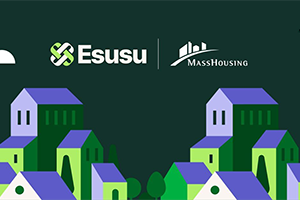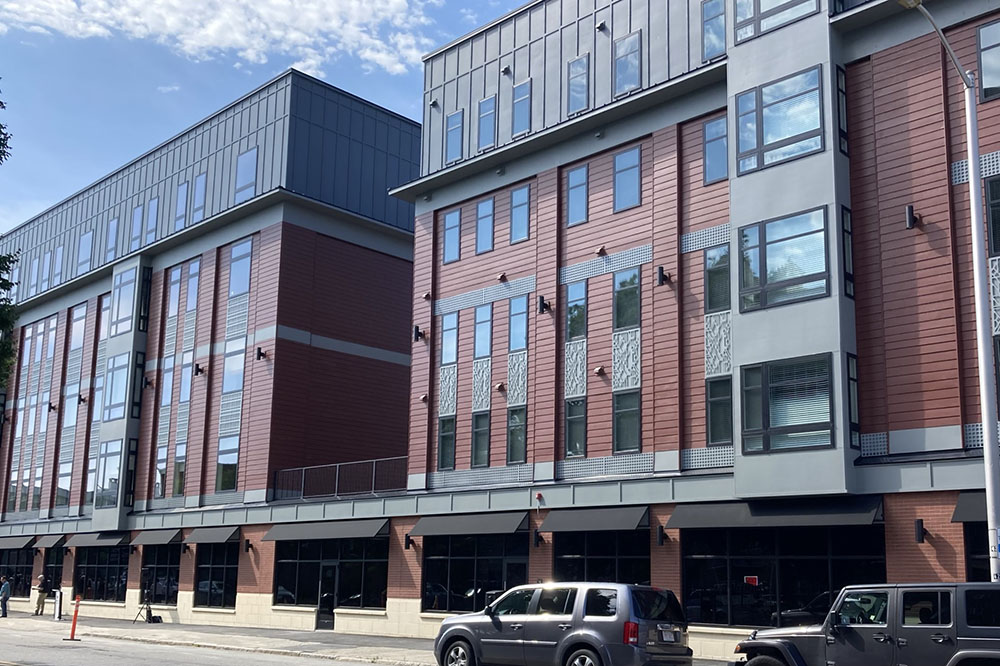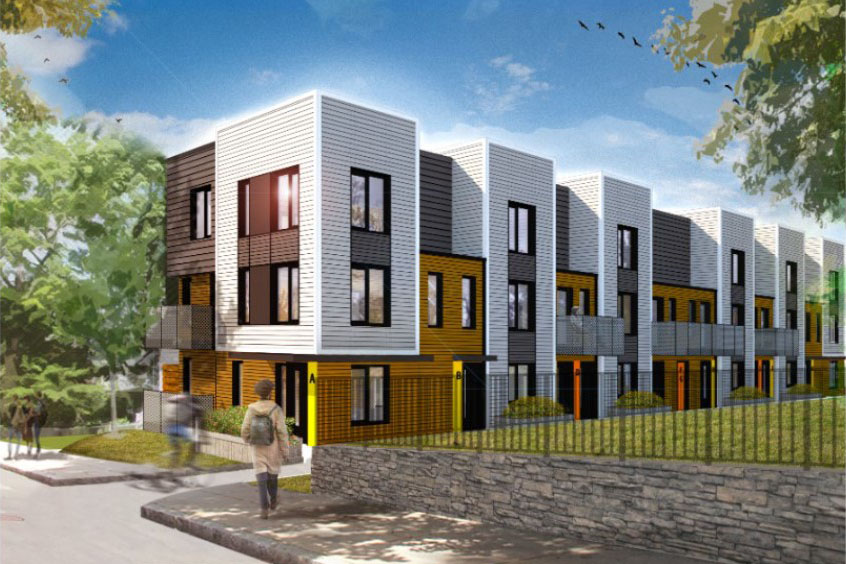BOSTON – September 26, 2024 – The Massachusetts Community Climate Bank (MCCB) convened more than 100 stakeholders from the environmental, housing development and finance sectors this week to celebrate progress achieved over the MCCB's first year, and to look ahead to significant levels of federal funding for energy efficiency and clean energy that will begin flowing into Massachusetts over the coming months.
"Massachusetts is proud to be home to the nation's first climate bank completely dedicated to affordable housing, and since launching last summer, the Massachusetts Community Climate Bank has made significant progress toward creating green, livable communities in our state," said Lieutenant Governor Kim Driscoll. "The Climate Bank is our financial engine for cutting residential emissions, while also improving health, equity and financial security in our communities. We believe that the Climate Bank can serve as a model for the rest of the nation on innovative solutions for our most pressing challenges."
Gov. Maura Healey announced the formation of the Massachusetts Community Climate Bank (MCCB) last year. The MCCB is the first green bank in the United States to focus on decarbonizing affordable housing, and it is a key component of the state's plans for achieving net zero carbon emissions in the year 2050. The MCCB is organized to blend federal, state and private funding with traditional affordable housing financing, in order to make high-impact clean energy improvements in affordable homes. Climate Bank investments will ensure that Environmental Justice communities, where residents bear a disproportionate burden in energy costs and climate impacts, will lead an equitable clean energy transition.
"With the establishment of the Community Climate Bank, Governor Healey signaled a big shift in how Massachusetts is approaching decarbonization," said Climate Chief Melissa Hoffer. "The Community Climate Bank is doing something really different — it is implementing a finance-based approach to the challenge of affordable housing decarbonization. I am excited to continue supporting the Massachusetts Community Climate Bank as they continue to grow and push Massachusetts homes to a cleaner future."
In the year since its launch, Massachusetts has built a nationally leading climate finance platform. This climate finance platform positions Massachusetts to be highly competitive for federal clean energy resources created under the federal Inflation Reduction Act.
The Inflation Reduction Act created a $27 billion Greenhouse Gas Reduction Fund (GGRF), administered by the U.S. Environmental Protection Agency. The EPA has awarded $7 billion in solar funding directly to grant recipients and $20 billion in financing to a handful of national nonprofit coalitions; the national financing coalitions are expected to begin funding state-level projects in early 2025. The MCCB is organized to place federal funding, state resources and private and philanthropic dollars alongside traditional affordable housing financing, in order to bring clean energy improvements to communities across the state.
Since its inception last year, the MCCB has:
- Engaged industry stakeholders across the housing and climate fields to introduce the MCCB and initiate a dialogue around how the bank could help them advance the state’s 2050 emissions goals.
- Demonstrated to national GGRF finance coalitions the state’s ability to quickly put GGRF funding to work in priority communities, including Justice40 communities. The MCCB offers GGRF coalitions an investible universe of 28,000 affordable rental homes that could be retrofitted with EPA funding over the next five years.
- Supported the Massachusetts Department of Energy Resource’s successful Solar for All application, which is bringing $156 million in federal solar funding to communities across the state.
- Launched the Energy Saver Home Loan Program, a $20 million state-funded program that will allow low- and moderate-income homeowners to make clean energy improvements to their homes through low-cost loans. The program offers unique wraparound customer service supports, as well as the ability to finance up to $100,000 in home improvements, with no cash up front.
- Joined U.S. GB50, a national coalition of green banks working together to advance the field of climate finance and share successes and best practices.
In recognition of this progress, NRDC recently ranked Massachusetts second nationally, in readiness to deploy federal climate funding.
"The Massachusetts Community Climate Bank brings together work in climate, housing, community development and environmental justice," said Maggie Super Church, Director of Policies and Programs at the Massachusetts Community Climate Bank. "This Climate Week, we are mindful of the extraordinary challenges involved in decarbonizing our entire economy, in a way that meets the needs of low- and moderate-income communities and households. It is important to take every opportunity to put that work forward in a way that meets this moment."
The housing stock in Massachusetts is among the oldest in the United States and Massachusetts homes are some of the most reliant in the country on oil heating. Residential and commercial buildings are responsible for 30 percent of all greenhouse gas emissions in Massachusetts, and 60 percent of building emissions are generated by single family and small multi-family homes. Transitioning these homes to clean energy is a core component of Massachusetts’s ambitious goal of achieving net zero carbon emissions in the year 2050.
From day one, the Healey-Driscoll administration has been committed to making Massachusetts a global leader in climate resilience and the clean energy economy. On Governor Healey’s first day in office, she established the nation’s first cabinet-level Climate Chief to coordinate climate policy across all executive agencies. Focused on making Massachusetts the world’s climate innovation lab, she recently proposed a $1 billion, 10-year investment in climatetech which will create thousands of good-paying jobs. Additionally, the administration has aligned state capital investment with mandated emissions reduction targets, established a clean energy innovation pathway for high school students, and signed an historic housing bond bill that provides $150 million to decarbonize state-owned public housing and incentives for development of energy efficient, fossil-fuel-free homes.
The Massachusetts Community Climate Bank is being incubated at MassHousing, the state’s affordable housing investment bank, in partnership with the Healey-Driscoll Administration, the Massachusetts Clean Energy Center, and MassDevelopment.
About the Massachusetts Community Climate Bank
Massachusetts Governor Maura Healey created the MCCB in June 2023, as the nation’s first green bank dedicated to affordable housing. MassHousing will incubate and steward the MCCB’s growth in collaboration with two partners that are experienced in delivering green energy solutions into sectors beyond affordable housing: the Massachusetts Clean Energy Center (MassCEC) and the Massachusetts Development Finance Agency (MassDevelopment). The MCCB is organized to promote clean energy solutions for low- and moderate-income households by leveraging federal, state, and private funds. Massachusetts has prioritized accelerated investment in affordable homes -- where residents bear a disproportionate burden of energy costs, and where families have been disproportionately impacted by pollution from fossil fuels. For more information about the MCCB, please visit our website at www.massclimatebank.com.
About MassHousing
MassHousing (The Massachusetts Housing Finance Agency) is an independent, quasi-public agency created in 1966 and charged with providing financing for affordable housing in Massachusetts. The Agency raises capital by selling bonds and lends the proceeds to low- and moderate-income homebuyers and homeowners, and to developers who build or preserve affordable and/or mixed-income rental housing. MassHousing does not use taxpayer dollars to sustain its operations, although it administers some publicly funded programs on behalf of the Commonwealth. Since its inception, MassHousing has provided approximately $29 billion for affordable housing. For more information, follow us on Twitter, Facebook, Instagram and LinkedIn.
###


